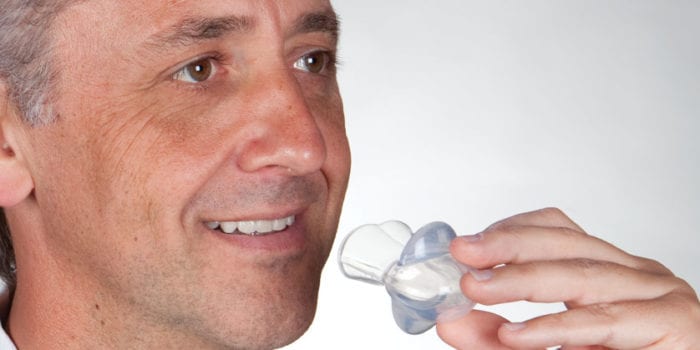Snoring: It’s a Common Problem
Do you suffer from problem snoring? You’re not alone. More than 60% of the adult population in the United States suffers from problem snoring. And the older you are, the worse it gets. As we age, the tissues in the upper airway lose elasticity and are more likely to vibrate during breathing which produces a snoring sound.
Who has problem snoring?1
- 60% of men and 40% of women over the age of 40 are habitual snorers.
- Children between the ages of 2 and 7, particularly if they have a chest infection or enlarged tonsils.
- Women during the later stages of pregnancy are more prone to snoring
What Causes Snoring?
Many factors can contribute to snoring. When we sleep the muscles and soft tissues in the mouth and throat relax. When we breathe in, these soft tissues are sucked back into the throat. Snoring happens when the upper airway narrows during sleep. This narrowing can be due to large tonsils, a soft palate, a long uvula or excessive flabby tissue at the throat, but most often the cause is a tongue muscle that has become too relaxed during sleep. Air traveling through this tube over the soft tissues creates vibration. When the tube is narrowed the air travels faster becoming more turbulent. Essentially, snoring is a sound resulting from turbulent airflow which causes tissues to vibrate during sleep.
Common causes of problem snoring2
- Sleeping on your back
- Large tonsils, soft palate or long uvula
- Over-relaxation of the tongue muscles
- Weight: A recent study showed that a 10% weight gain may make you 6 times more likely to develop problem snoring.
- Nasal congestion
- Smoking, alcohol or medication (which cause drowsiness)
- Hypothyroidism
- Menopause
Stop Snoring, Improve Quality of Life
Problem snoring has an enormous impact on quality of life. Snoring is number three on the list of reasons why couples divorce! Snoring negatively impacts sleep quality which has a negative impact on overall health and wellness. Snoring is also associated with a number of serious health risks3:
- Sleep apnea
- High blood pressure
- Diabetes
- Depression
- Morning headaches
- Extreme daytime sleepiness
- Strokes
- Memory problems
- Reflux and heartburn
- Nocturia
- Insomnia
- Impotence
Good News: Your Dentist Can Help

Philadelphia dentist Dr. Pamela Doray offers a variety of treatments to help patients overcome problem snoring. The most effective treatment is to open the airway during sleep and reduce vibrations. This is typically achieved by using an oral appliance to hold the tongue forward.
We are pleased to offer a simple, low-cost device called aveoTSD® (Tongue Stabilizing Device). Alternative devices move the tongue forward indirectly by repositioning the jaw. This can cause stress on the jaw joints and muscles. The aveoTSD gently suctions onto the tongue, preventing it from falling back into the throat and obstructing the airway.
Benefits of aveoTSD
- Simply and easy to use.
- Intuitive fit does not require specialist fitting.
- Does not fit to the teeth or jaws like traditional jaw advancement devices.
- It requires no impressions, no adjustments and has no moving parts.
- It’s easy to use, affordable and it works.
- Comes with a six-month replacement warranty from the date of purchase for product defects determined to be caused by manufacturer.
- The life expectancy of the aveoTSD is 12 months. With proper use and care, this could stretch up to 24 months.
The aveoTSD is only available by prescription through a licensed dentist or medical physician. Contact our Philadelphia dental office today to schedule a consultation and find out if aveoTSD is right for you. Call Dr. Doray at (215) 395-6076 or request an appointment online.
References:
1. aveoTSD Education Manual. “Who has problem snoring?” p. 5
2. aveoTSD Education Manual. “Common causes of problem snoring” p. 6
3. aveoTSD Education Manual. “Disorders linked to problem snoring” p. 8
